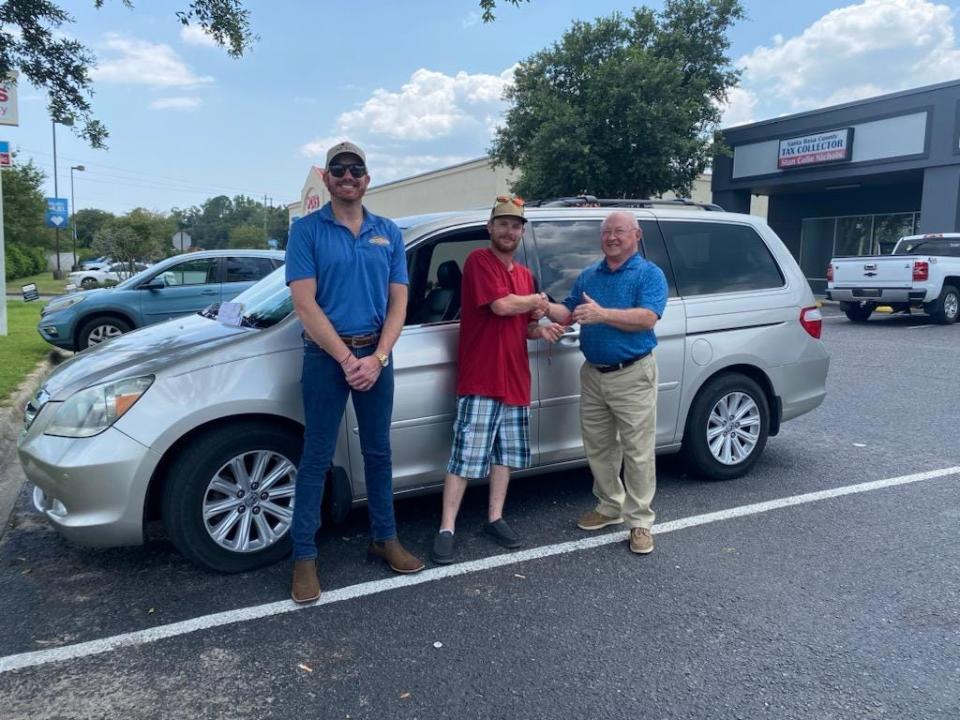Next Step Vehicles are using donated cars to prevent homelessness in Pensacola
A group of Pensacola non-profits are partnering together to give cars to women, families and veterans in need in Northwest Florida.
The new program is called Next Step Vehicles and is a partnership between Pensacola Dream Center, 90Works, and United Ministries that is being coordinated by the Northwest Florida Homelessness Reduction Taskforce.
The idea for the program arose from a discussion after a meeting of a subcommittee on the Northwest Florida Homeless Taskforce. Bobby Phillips with Olive Baptist Church mentioned to others that he knew of a family at his church willing to donate a car but didn't know the best way to do it.
Rev. Ashley Meyer, executive director of United Ministries, said they were enthusiastic about the idea, but questions came up about liability and the cost of transferring a vehicle.
"There are big questions that arose quickly, but we also thought this would be phenomenal if we could coordinate something like this," Meyer said.
Connie Bookman, founder and CEO of Northwest Florida Homeless Reduction Task Force, brought together Meyer, Phillips, Rocky Harrison, president of operations at 90Works; and Terri Merrick, executive director of the Pensacola Dream Center, and Next Steph Vehicles, was born.
Bookman said they might expand the program to more non-profits in the future, but for now, they are approaching the program as an "incubator" for the concept of using donated vehicles to keep people from homelessness.
"We're starting with these three organizations that kind of capture our population, so families, women and veterans," Bookman said. "The community has got to be patient. We're not going to add (more non-profits) yet until we have given away many cars."
The three non-profits are working together to identify potential people who need the cars by meeting a need threshold score based on factors such as income, employment and housing status.
"The needs are there, whether it's one of our people that's coming out of recovery or a trafficking survivor that's trying to get back on their feet, or it's a family that's struggling to get going again," Merrick said.
First car donated
After discussion among the group, 90Works, which helps homeless veterans or veterans facing homelessness, identified a father of six in the 90Works program. The man was searching for a job and needed a vehicle after his car had been totaled in an accident with a drunk driver. By the next week, a used Honda Odyssey had been donated and transferred to its new owner.
"90Works was able to financially assist to pay that insurance premium, and then when we got to the tax collector, we assisted financially with tax, tag and title," Harrison said. "… It was very seamless the way that it went, and it was just everybody working together to make that donation happen."

The three non-profits are hoping to replicate that process on a larger scale through the Next Step Vehicle program. They've also brought in volunteers willing to help do repair work to get an otherwise unusable car in shape to donate or help a person stay in their vehicle.
Repairing vehicles and preventing homelessness
Volunteer Michael King, who is a retired healthcare administrator and car aficionado who works for a national auto parts store more as a hobby, said they are working to set up a network of people willing to help work on cars for the program.
"If you lose your vehicle, you lose your way to get to work," King said. "If you don't get to work, you lose your job. You lose your job, you lose your home. I mean, it's that cascade."
Meyer said the need for reliable transportation along with providing help for rent and utilities, which other groups are doing, go a long way to preventing a person from falling into homelessness.
"The prevention of homelessness is a need that I think is kind of hidden, and so anything that we can do to elevate that it is a huge need," Meyer said. "And if we don't want to see more people standing on the street corners, then we have to eliminate these barriers and come together to do that."
The group is seeking car donations to get the program going, and more information can be found on the Northwest Florida Homelessness Reduction Taskforce's website.
King said other non-profits regularly accept donations of cars, which provide the former owner a significant tax write-off, but those non-profits will typically turn around and sell the car at auction.
"In this instance, the car is going to be provided to someone who is in this community, who has been screened and vetted and has a genuine need," King said. "And it's ultimately reducing homelessness in this community."
This article originally appeared on Pensacola News Journal: Next Steps Vehicles finding donated cars to reduce homelessness

